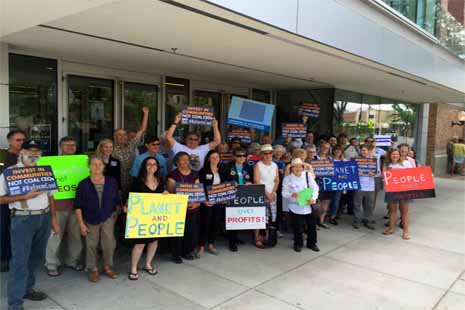In Casper, in Salt Lake City, in Knoxville, in Seattle, in Grand Junction, and in Billings, WORC members made a strong case to reform federal coal leasing and detailed issues that need to be addressed. Scoping hearings around the country drew big crowds, where landowners, small business owners, local government officials, faith leaders, anglers and hunters, tribal leaders, and conservationists offered solid specifics for the Bureau of Land Management (BLM) to look at during a three-year study on how to reform federal coal management.
Over 40% of the coal produced in the United States belongs to the people of the United States, and a growing list of reports—both public and private—detail how the public has been short changed in recent decades, and that the public interest is given short shrift in federal coal management. Instead, the outdated federal coal program allows industry to drive the process. According to a recent Government Accountability Office report, over 90% of federal coal leases were sold without any competitive bidding, depressing the value that the public receives for the resource.
Other reports point to losses as high a $1 billion/year over the past 30 years due to poor federal management practices.
“I come from upstream,” Bob LeResche, chairman of the Powder River Basin Resource Council, in Sheridan, Wyoming, told a Seattle crowd, “And I want to welcome you to our 40-year fight.”
Speaking to a rally of coal reform supporters in Seattle, Powder River Basin Resource Council (PRBRC) Chair Bob LeResche cited the high external costs of coal, the need for better efforts to reclaim already disturbed lands, and the need to both modernize and simplify coal leasing practices.
In Billings, at a meeting organized by Sen. Steve Daines of Montana to rally coal industry supporters, Northern Plains past chair Steve Charter provided a strong cautionary counterpoint:
“It’s high time that taxpayers get a fair price for public coal,” Steve Charter said.
He called for collecting a fair price from public coal and using the money to help coal-dependent communities transition away from coal as the fuel source loses market share to natural gas.
In addition to Billings, Charter spoke at a large meeting in Salt Lake City on May 19, along with Idaho Organization of Resource Councils board member Julia Page, who noted how important outdoor recreation has become as an economic engine in the West and the need to protect key values like clean air and clean water.
In Knoxville, Northern Plains Resource Council Chair Kate French spoke up for the need to dedicate fair market value revenues to help communities transition to sustainable long term economic vitality. In Casper, several dozen leaders, members and allies of PRBRC and Northern Plains spoke in favor of reform. Also, in Seattle, Mark Fix, Tongue River Valley irrigator, delivered a message on the need to account for climate costs, and for impacts of hauling coal by rail for exports on agricultural and other communities.
In Grand Junction on June 23 hundreds turned out, a strong grassroots contingent stood in support of coal lease reforms, including Western Colorado Congress (WCC) leaders, and former Northern Plains chair Beth Kaeding, who traveled all the way from Montana to speak.
On July 28, 2016, WORC, DRC, Northern Plains, PRBRC, and WCC joined with other organizations to send a letter to Interior Secretary Sally Jewell. The groups wrote that reform measures should achieve these objectives:
- Ensuring a fair return to the American public for the leasing and mining of our publicly owned mineral resources by increasing royalty rates and closing loopholes in coal valuation processes;
- Increasing transparency of and public oversight around the federal coal program;
- Preventing impacts of coal leasing, mining, and burning on the global climate;
- Better protecting our air, land, water, and wildlife resources; and
- Addressing the legacy issues of decades of federal coal mining, including ensuring reclamation of currently leased areas before new leasing can proceed.
Read more coal stories here.
Read more:
Investigation of Ramaco Principals Reveals Shady History
Current State of Coal Industry and Mineral Tax Collection Creates a Tax Time-bomb
Unanimous Vote by Wyoming Environmental Quality Council Clears the Way for Strong Self-Bonding Rules


